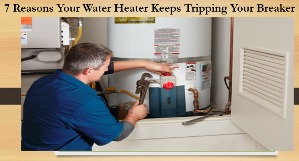
Circuit breakers are designed to protect your circuits and appliances from overload, short circuits and faulty currents. If your water heater is tripping breaker, there may be a problem either with your water heater, the wiring system or your circuit breaker.
Water heaters use more energy than most appliances, and are required to be on a 30 amp dedicated circuit breaker in the electrical panel.
If your own is causing your circuit breaker to be tripping repeatedly, follow these steps to fix it.
Possible reasons your water heater keeps tripping the circuit breaker
There are four major reasons your electric water heater is tripping your electrical circuit, these include:
Circuit overload
A water heater superposes be on a dedicated circuit. If the water heater is sharing the same circuit with other devices, it may result in circuit overload and thus trip the breaker.
Burnt-out heating element
Damaged heating elements are one of the major reasons your water heater trips a breaker.
The heating element is part of the water heater that heats the water. If it has damaged, it will cause the breaker to trip.
There are so many factors that can damage the heating element of a water heater, these include short circuits, mineral deposits on the element, rusting, physical damage and others.
When the water heater element is damaged, its resistance will decrease. This will increase the power consumption of the heater tank, and also result in tripping the breaker.
To determine if the heating element is bad, use a multimeter to check for any abnormal resistance readings.
If the reading varies from the rating of the heating element, then it is damaged.
In a few other cases, the casing of the heating element may break, exposing the electrical part of the element to the water in the tank.
This can lead to a short circuit and subsequent tripping of the limit switch or breaker.
Bad thermostat
A faulty thermostat can also cause your circuit breaker to trip. A thermostat is a part of the heater tank that controls water temperature.
Water heaters usually have a limit switch that prevents water from exceeding 180 degrees Fahrenheit. When the water gets too hot, the limit switch trips, preventing the water from getting hotter.
Most water heaters usually come with two thermostats and two heating elements, one for each other.
If the thermostat is faulty, it may not read accurately. This will allow the heating element to draw more power than rated until it overload and turn off the circuit breaker.
To check if the thermostat is bad, use a multimeter and test each of them. If you get a different reading from the two thermostats, one is probably bad.
The one with low resistance or current flow rate is probably bad and should be replaced.
Bad breaker or electrical wiring
A faulty breaker may also be the reason your breaker is tripping. Though very rare, the circuit breaker component may damage and cause your breaker to trip even below the current specified limit.
Bad wiring along the breaker and the heater tank can also trip your breaker. If there is a loose connection, partial contact or wrong connection along the circuit, it will cause a short-circuit and probably trip off your circuit.
In this case, the wiring system should be checked. You can also reset the breaker to see if that solves the problem.
If the breaker continues to trip after resetting, contact an electrician or a professional water heater serviceman to help you solve the problem.
Water leak
Normally, it is important to always inspect your heater tank to ensure it is leak free. When there is a water leak, it may come in contact with the electrical components resulting to an electric shock or ground faults.
To avoid these hazards, it is advisable to always turn off your circuit breaker or power source and seek professional help.
Conclusion
Troubleshooting a water heater that keeps tripping your breaker requires checking the electrical connections, inspecting the heating element, the thermostat, checking for overload, and for water leak.
It is always advisable to seek the assistance of a professional plumber or electrician to help you and resolve the problem. Since fixing it yourself may even result in a bigger problem.
Related articles